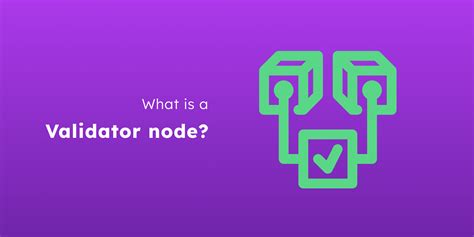Title: The role of validator nodes in the guarantee of cryptocurrency blockchains: a comprehensive guide
Introduction
Cryptocurrency, such as bitcoin and ethhereum, depend on complex algorithms to protect your blockchains. A crucial component that allows this safety is the validation process, which involves us to check transactions and adding new blocks to the blockchain. These validator nodes play a vital role to ensure network integrity. In this article, we will delve deeper into the world of the validator’s knots, exploring how they contribute to ensure cryptocurrency blockchains.
What are we in the validator?
Validator nodes are specialized computers that perform the software designed to validate transactions and new blocks in a blockchain. They are responsible for verifying the authenticity and legitimacy of transactions, ensuring that new blocks are added to the chain safely. Each node is identified by its public key or mnemonic seed, which serves as its unique identifier.
Types of Volidator Nodes
There are several types of nodes in the validator:
- Complete knot : A complete knot connects to multiple blockchain networks and acts as an intermediary between them.
- Light knot : A light knot that connects only to a single blockchain network.
- Swarm : An aggregation of various nodes of validators, who work together to validate transactions and new blocks.
As the validator nodes protect the blockchain
The validators’ nodes guarantee the safety of cryptocurrency chains through various mechanisms:
- Transaction Check : Each node verifies the validity of the transactions received by checking the sender’s public key, the recipient’s address and the amount being transferred.
- Block Validation : A valid node new blocks, ensuring that transactions within them are valid and no double spending occurred.
3.
Risks and security challenges
Although validators’ nodes contribute significantly to ensuring cryptocurrency blockchains, there are risks and challenges associated with their operation:
1.
- Network congestion : Excessive nodes connections can lead to congestion, reduce performance and increase power consumption.
- Node faults : A single point failure (ie a node is offline) can interrupt the entire network.
Best practices for validator node operation
To ensure the safe operation of the validator nodes:
- Use safe private keys : Store private keys using methods such as hardware wallets or cold storage.
- Backup regularly data : Regular backups are essential to avoid data loss if a node is compromised or experiences a failure.
- Monitor Network Activity : Continuously monitor network activity and detect possible security threats.
- Implement Node Reputation Systems

: Consider implementing reputation systems for us from the validator to encourage honest behavior.
Conclusion
Validator nodes play a critical role in obtaining cryptocurrency blockchains, checking transactions, adding new blocks and ensuring network integrity. Understanding how they operate, their strengths and weaknesses, and the best practices for operation can help developers, exchanges, and cryptocurrency users with cryptocurrency mitigate risks and potential security threats of these networks.
Recommendations
For developers:
- Use respectable software : Choose software of known suppliers regularly updated with safety patches.
2.